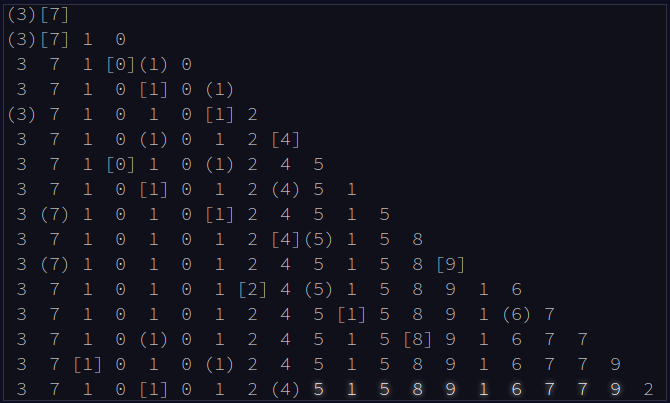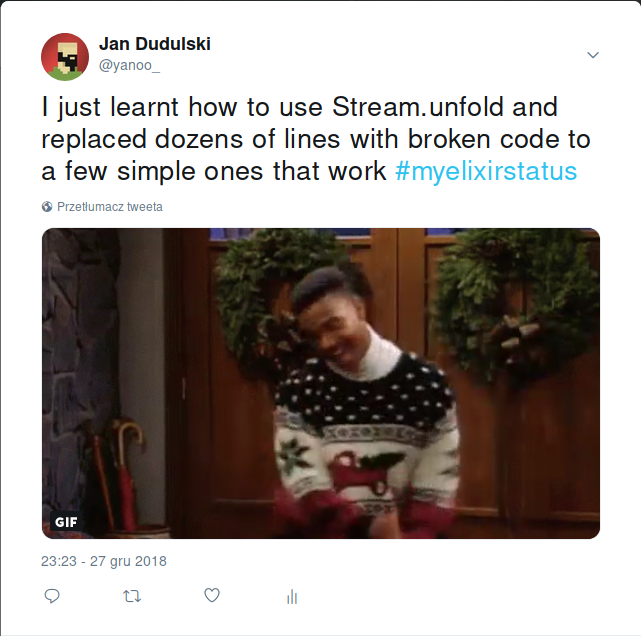Stream.unfold

Working with Elixir?
You will be bored

Working with FP?
Probably you will be bored

Never worked with FP?
It might be rocket science

But fear not, it's not that complicated
Who I am?

- I work with Ruby for ~7 years
- I had FP on studies more than 10 years ago
- Never worked with FP
- Monads still confuse me
Inspiration


Initial attempt


Stream.unfold for the rescue


Let's start simple


def example(foo)
array = []
for i in 1..10
array[i - 1] = i * foo
# or
array = suprise_me(array, i, foo)
end
array
endStructural approach
def example(foo)
(1..10).map do |i|
i * foo
# or
function_call(i, foo)
# can't happen
suprise_me(array, i, foo)
end
endFunctional approach
- no mutations
- no side effects
- declarative
- more readable, but
- requires a different way of thinking

Family of functions


Family of functions
enum.map { |i| i * 2 }
enum.select { |i| i % 2 == 0 }
enum.reject { |i| i % 2 == 0 }
enum.take(5)
enum.sort { |x, y| x <=> y }
enum.all? { |i| i % 2 == 0 }
enum.any? { |i| i % 2 == 0 }
# and moreGodfather


Godfather

- fold
- reduce
- accumulate
- aggregate
- compress
- inject
Map with reduce

# Ruby
def map(collection, &fun)
collection.inject([]) do |acc, elem|
acc + [fun.call(elem)]
end
end
# Elixir
def map(collection, fun) do
collection
|> Enum.reduce([], fn elem, acc ->
acc ++ [fun.(elem)]
end)
endHomework

Implement Enum functions with reduce
Time for fun part - Laziness


Stream

A lazy version of Enum module
1..1_000_000
|> Stream.map(fn x -> x * 2 end)
|> Stream.filter(fn x -> rem(x, 2) == 0 end)
|> Enum.take(5)
Stream.iterate/2
Stream.unfold/2
Think: "values generator"
start_value
|> Stream.iterate(fn current_value ->
next_value
end)Think: "reduce reverse"
{0, 1}
|> Stream.unfold(fn {current, next} ->
{
current,
{
next,
current + next
}
}
end)
# {0, {1, 1}}
# {1, {1, 2}}
# {1, {2, 3}}
# {2, {3, 5}}
# {3, {5, 8}}
Back to AoC

Back to AoC

{elf1, elf2} = {0, 1}
scores = :array.new()
scores = :array.set(elf1, 3, scores)
scores = :array.set(elf2, 7, scores)
{scores, elf1, elf2, 0}
|> Stream.unfold(fn {scores, elf1, elf2, index} ->
elf1_score = :array.get(elf1, scores)
elf2_score = :array.get(elf2, scores)
scores =
combine_recipes(elf1_score, elf2_score)
|> Enum.reduce(scores, fn recipe, scores ->
:array.set(:array.size(scores), recipe, scores)
end)
elf1 = Integer.mod(elf1 + elf1_score + 1, :array.size(scores))
elf2 = Integer.mod(elf2 + elf2_score + 1, :array.size(scores))
{:array.get(index, scores), {scores, elf1, elf2, index + 1}}
end)
|> Stream.drop(681_901)
|> Enum.take(10)When organised

{scores, elf1, elf2} = init()
scores
|> unfold_stream(elf1, elf2)
|> Stream.drop(puzzle_input)
|> Enum.take(10)Initialization

# positions
{elf1, elf2} = {0, 1}
# initial array of scores
scores = :array.new()
scores = :array.set(elf1, 3, scores)
scores = :array.set(elf2, 7, scores)
# result
{scores, elf1, elf2}Helper

def combine_recipes(left, right) do
(left + right) |> Integer.digits()
endJust the meat

Stream.unfold(fn {scores, elf1, elf2, index} ->
# current elves' scores
elf1_score = :array.get(elf1, scores)
elf2_score = :array.get(elf2, scores)
# append new recipe(s)
scores =
combine_recipes(elf1_score, elf2_score)
|> Enum.reduce(scores, fn recipe, scores ->
:array.set(:array.size(scores), recipe, scores)
end)
# move elves
elf1 = Integer.mod(elf1 + elf1_score + 1, :array.size(scores))
elf2 = Integer.mod(elf2 + elf2_score + 1, :array.size(scores))
# return value for CURRENT index and new accumulator
{:array.get(index, scores), {scores, elf1, elf2, index + 1}}
end)Usage

{scores, elf1, elf2} = init()
scores
|> unfold_stream(elf1, elf2)
|> Stream.drop(puzzle_input)
|> Enum.take(10)Conclusion

- functional means declarative
- when your code becomes huge and imperative - stop and re-think



We're hiring!

source: https://elixir.career/
Stream.unfold
By Jan Dudulski
Stream.unfold
- 183



